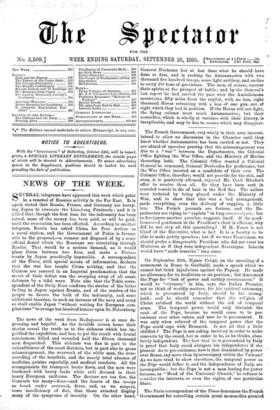The news of the week from Madagascar is at once
de- pressing and hopeful. As the invalids return home their stories reveal the truth as to the sickness which has im- perilled the expedition, and has, to put the result with brutal conciseness, killed and wounded half the fifteen thousand men despatched. This sickness was due in part to the unhealthiness of the coast districts, but in part also to gross mismanagement, the overwork of the white men, the over- crowding of the hospitals, and the nearly total absence of medicine, quinine especially, and medical comforts. All the arrangements for transport broke down, and the men were burdened with heavy loads while still dressed in their heavy European uniforms. The doctors are too few, the Generals too many—four—and the hearts of the troops so break ender overwoi k, fever, and, as we suspect, some insufficiency of diet, that those attacked display many of the symptoms of insanity. On the other hand, General Duchesne has at last done what he should have done at first, and is rushing for Antananarivo with two thousand five hundred troops, some light artillery, and coolies to carry 250 tons of provisions. The men, of course, recover their spirits at the prospect of battle ; and by the General's last report he had carried the pass over the Ambohimena mountains, fifty miles from the capital, with no loss, eight thousand Hovas retreating with a loss of one gun, out of eight which they had in position. If the Hovas will not fight, the flying column mast reach Antananarivo ; but their cowardice, which is wholly at variance with their history, is inexplicable, and may be due to causes which may disappear.






































